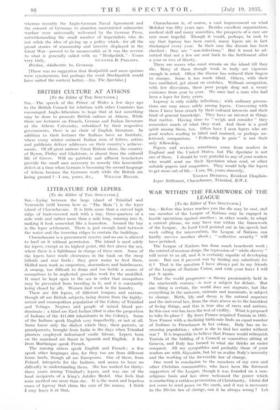LITERATURE FOR LEPERS.
[To the Editor of THE SPECTATOR.]
Sin,—Lying between the large island of Trinidad and Venezuela (still known here as " The Main ") is the leper island of Chaeachaeare. It is little more than a curved high ridge of bush-covered rock with a bay, three-quarters of a mile wide and rather more than a mile long, running into it, making it look somewhat like a horseshoe. Around the bay is the leper settlement. There is just enough land between the water and the towering ridges to contain the buildings.
Chacachacare is a government reserve and no one is allowed to land on it without permission. The island is used solely for lepers, except at its highest point, 865 feet above the sea, where there is a lighthouse in charge of three men. Soine of the lepers have made clearances in the bush on the steep hillside and rear fowls ; they grow maize to feed them. Skilled men work as carpenters, shoemakers and hairdressers. A swamp, too difficult to drain and too fertile a source of mosquitoes to be neglected, provides work for the unskilled. It must be kept open to the sea in order that mosquitoes may be prevented from breeding in it, and it is constantly being closed by silt. Women find work in the laundry.
There are 420 lepers, of different tongues and nations, though all are British subjects, being drawn from the highly- mixed and cosmopolitan population of the Colony of Trinidad and Tobago. Negroes and people of mixed blood pre- dominate : a third are East Indian (that is also the proportion of Indians of the 411,000 inhabitants in the Colony). Some of the Indians. speak English very imperfectly, or not at all. Some know only the dialect which they, their parents, or grandparents, brought from India in the days when Trinidad planters employed indentured coolie labour. Lepers born on the mainland are fluent in Spanish and English. A few from Martinique speak French.
The nursing sisters speak English and French ; a few speak other languages also, for they too are from different home lands, though all are Europeans. One of them, from Poland, interprets for the Indians, and seems to have no difficulty in understanding them. She has worked for thirty- three years among Trinidad's lepers, and was one of the local recipients of a King's Jubilee Medal. One feels that none merited one more than she. It is the worst and hopeless cases of leprosy that claim the care of the nurses. I think I may leave it at that.
Chaeachacare is, of course, a vast improvement on what Molokai was fifty years ago. Besides excellent organization, medical skill and many amenities, the prospects of a cure are now more hopeful. Though it would, perhaps, be rash to say that leprosy has been cured, many lepers are in fact discharged every year. In their case the diseaSe has been checked : they arc "non-infectious." But it must be ad- mitted that not a few are sent back to the Settlement after a year or two of liberty.
There are scores who must remain on the island till they die. Many of these though weak in body are vigorous enough in mind. Often the disease has reduced their fingers to stumps. Some it has made blind. Others, with their toes mutilated, get about on crutches. Without occupation, with few diversions, these poor people drag out a weary existence from year to year. We once had a man who had been a leper for forty years.
Leprosy is only mildly infectious ; with ordinary precau- tions one may move safely among lepers. Conversing with them I have been struck by their cultural interests and their fund of general knowledge. They have an interest in things that matter. Having time to "weigh and consider" they remember much of what they read. And there is a good spirit among them, too. Often have I seen lepers who are good readers reading to blind and maimed, or perhaps un- lettered, companions. "Fellowship in pain" is not their only fellowship.
Papers and reviews sometimes come from readers in England and the United States, but The Spectator is not one of them. I should be very grateful to any of your readers who would • send me their Spectators when read, or other suitable papers and magazines. They would help the lepers to get more out of life.—L am, Sir, yours sincerely,


























































 Previous page
Previous page